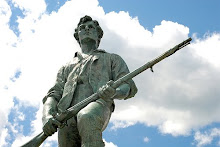[Excerpts from Common Sense and from Rights of Man]
In America THE LAW IS KING
...how necessary it is at all times to watch against the attempted encroachment of power, and to prevent its running to excess.
...it is necessary to consider a Constitution in both its cases: -First, as creating a Government and giving it powers. Secondly, as regulating and restraining the powers so given.
[FIRST]
The Constitution of a county is not the act of its Government, but of the people constituting a Government.
...individuals themselves, each in his own personal and sovereign right, entered into a compact with each other to produce a Government
It may not be improper to observe that in both those instances (the one of Pennsylvania, and the other of the United States) there is no such thing as an idea of a compact between the people on one side and the Government on the other. The compact was that of the people with each other to produce and constitute a Government. To suppose that any Government can be a party in a compact with the whole people is to suppose it to have existance before it can have a right to exist.
A Constitution is not the act of a Government, but of a people constituting a Government; and a Government without a Constitution is power without a right. All power exercised over a Nation must have some beginning. It must either be delegated or assumed. There are no other sources. All delegated power is trust, and all assumed power is usurpation.
[SECONDLY]
...the check is the Constitution, which in effect says, Thus far shalt thou go and no further.
...the authority of future assemblies will be to legislate according to the principles and forms prescribed in that Constitution; and if experience should hereafter show that alterations, amendments, or additions are necessary, the Constitution will point out the mode by which such things shall be done, and not leave it up to the discretionary power of the future Government.
A Government on the principles on which constitutional Governments arising out of society are established, cannot have the right of altering itself. It it had, it would be arbitrary. It might make itself what it pleased; and wherever such a right is set up, it shows there is no Constitution.
From the want of a Constitution in England to restrain and regulate the wild impulse of power, many of the laws are irrational and tyrannical, and the administration of them vague and problematical.
[Recall that England does not have a written Constitution and instead relies on its body of common law and court rulings to determine the authority of government]
Almost every case now must be determined by some precedent, be that precedent good or bad, or whether it properly applies or not.
Whatever the form or Constitution of Government may be, it ought to have no other object than the general happiness. When instead of this it operates to create or increase wretchedness, in any parts of society, it is on a wrong system and reformation is necessary.
[Note, the "general happiness" not the "happiness of the majority." Any Government that purposely places the burdens of society on a part or a minority in order to benefit the majority is wrong and demands redress.]







